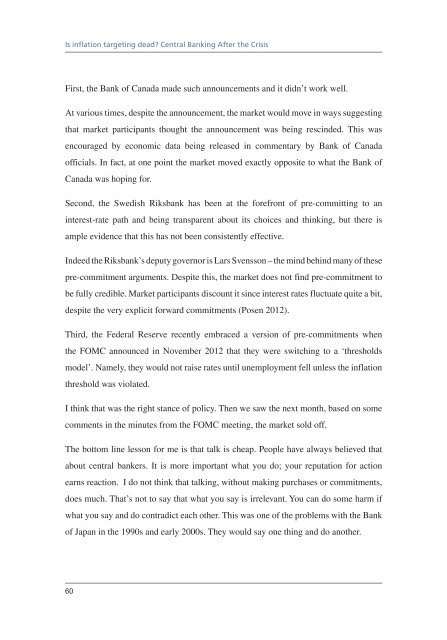Is inflation targeting dead? Central Banking After the Crisis - Vox
Is inflation targeting dead? Central Banking After the Crisis - Vox
Is inflation targeting dead? Central Banking After the Crisis - Vox
Create successful ePaper yourself
Turn your PDF publications into a flip-book with our unique Google optimized e-Paper software.
<strong>Is</strong> <strong>inflation</strong> <strong>targeting</strong> <strong>dead</strong>? <strong>Central</strong> <strong>Banking</strong> <strong>After</strong> <strong>the</strong> <strong>Crisis</strong>First, <strong>the</strong> Bank of Canada made such announcements and it didn’t work well.At various times, despite <strong>the</strong> announcement, <strong>the</strong> market would move in ways suggestingthat market participants thought <strong>the</strong> announcement was being rescinded. This wasencouraged by economic data being released in commentary by Bank of Canadaofficials. In fact, at one point <strong>the</strong> market moved exactly opposite to what <strong>the</strong> Bank ofCanada was hoping for.Second, <strong>the</strong> Swedish Riksbank has been at <strong>the</strong> forefront of pre-committing to aninterest-rate path and being transparent about its choices and thinking, but <strong>the</strong>re isample evidence that this has not been consistently effective.Indeed <strong>the</strong> Riksbank’s deputy governor is Lars Svensson – <strong>the</strong> mind behind many of <strong>the</strong>sepre-commitment arguments. Despite this, <strong>the</strong> market does not find pre-commitment tobe fully credible. Market participants discount it since interest rates fluctuate quite a bit,despite <strong>the</strong> very explicit forward commitments (Posen 2012).Third, <strong>the</strong> Federal Reserve recently embraced a version of pre-commitments when<strong>the</strong> FOMC announced in November 2012 that <strong>the</strong>y were switching to a ‘thresholdsmodel’. Namely, <strong>the</strong>y would not raise rates until unemployment fell unless <strong>the</strong> <strong>inflation</strong>threshold was violated.I think that was <strong>the</strong> right stance of policy. Then we saw <strong>the</strong> next month, based on somecomments in <strong>the</strong> minutes from <strong>the</strong> FOMC meeting, <strong>the</strong> market sold off.The bottom line lesson for me is that talk is cheap. People have always believed thatabout central bankers. It is more important what you do; your reputation for actionearns reaction. I do not think that talking, without making purchases or commitments,does much. That’s not to say that what you say is irrelevant. You can do some harm ifwhat you say and do contradict each o<strong>the</strong>r. This was one of <strong>the</strong> problems with <strong>the</strong> Bankof Japan in <strong>the</strong> 1990s and early 2000s. They would say one thing and do ano<strong>the</strong>r.60














